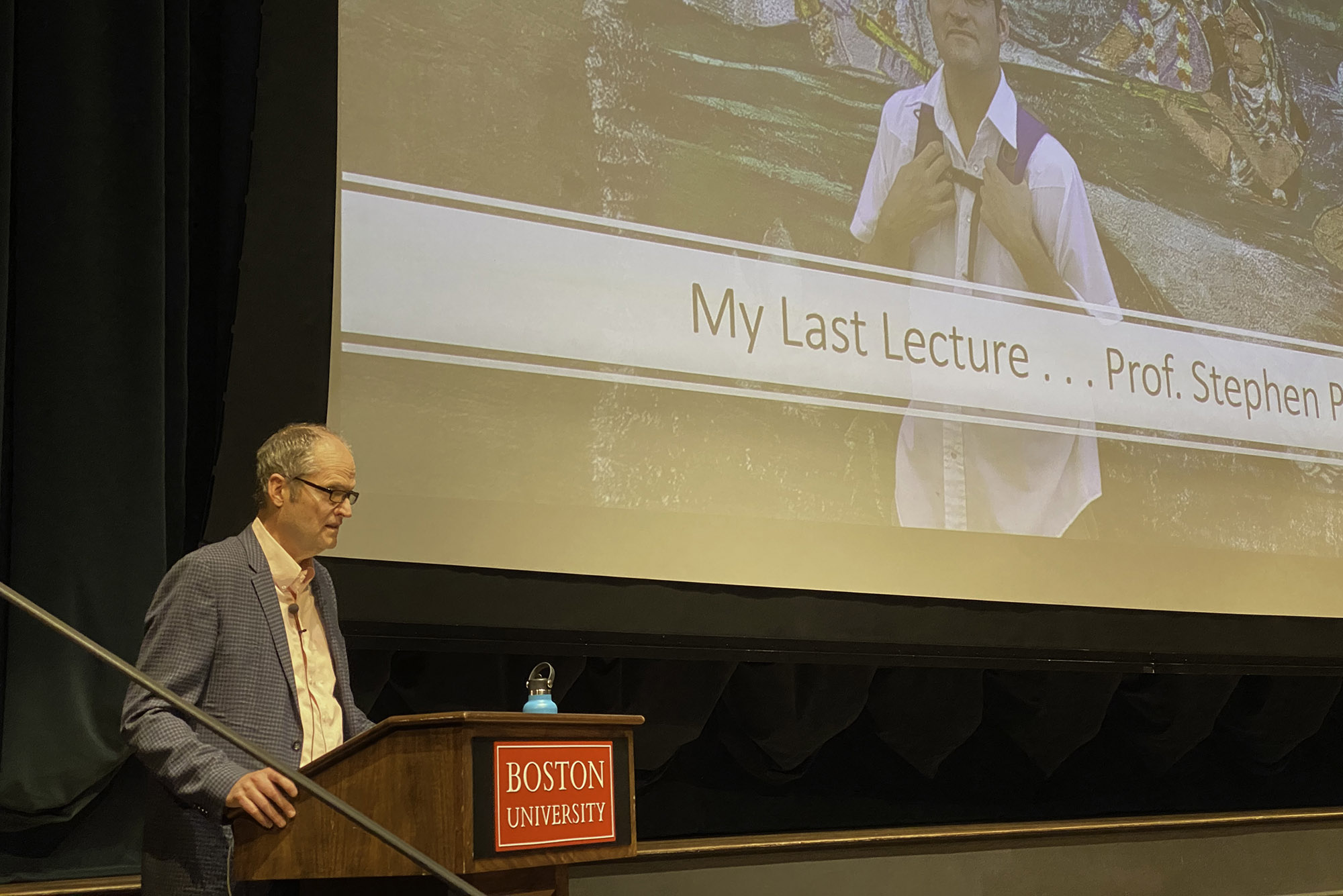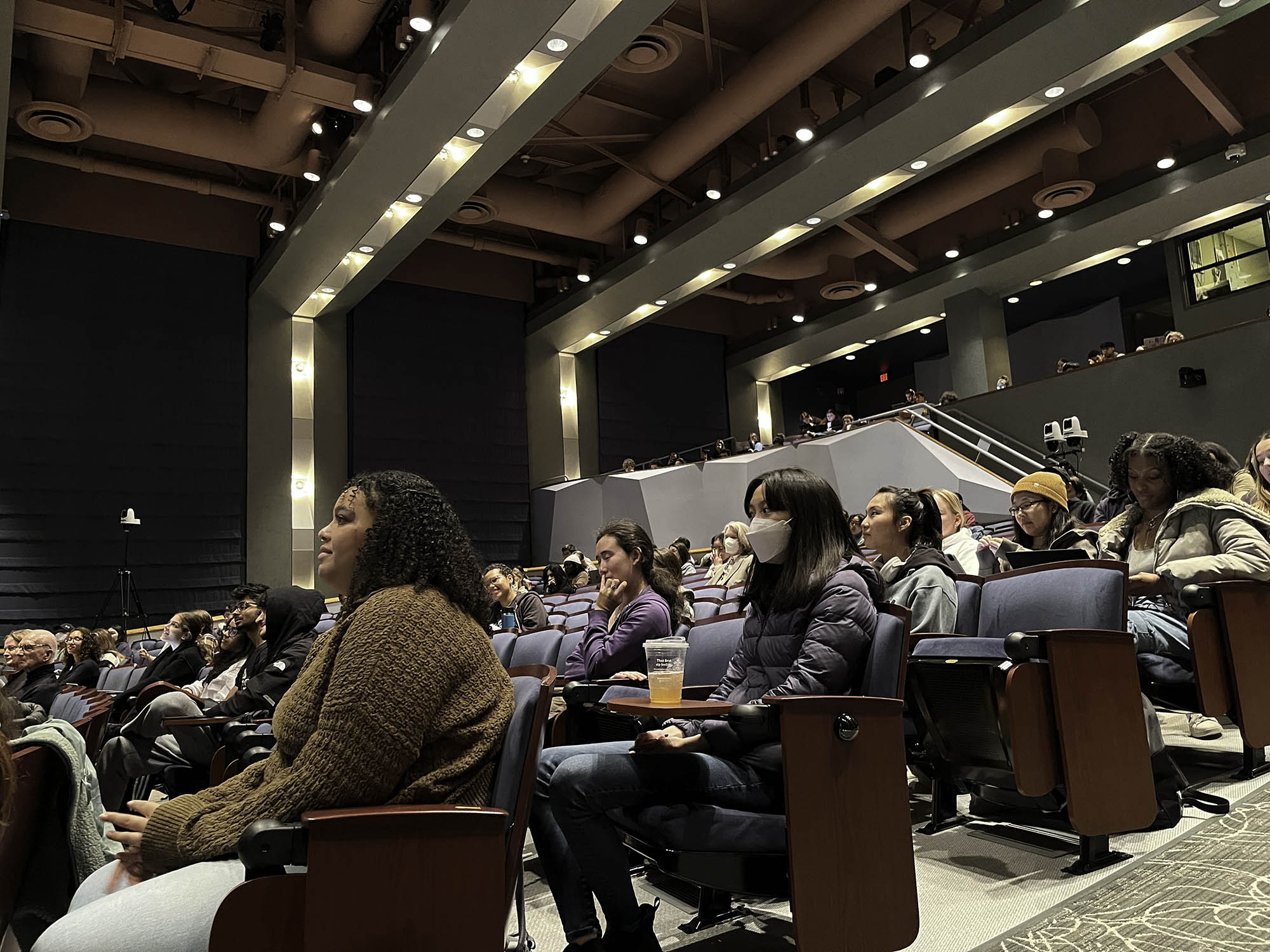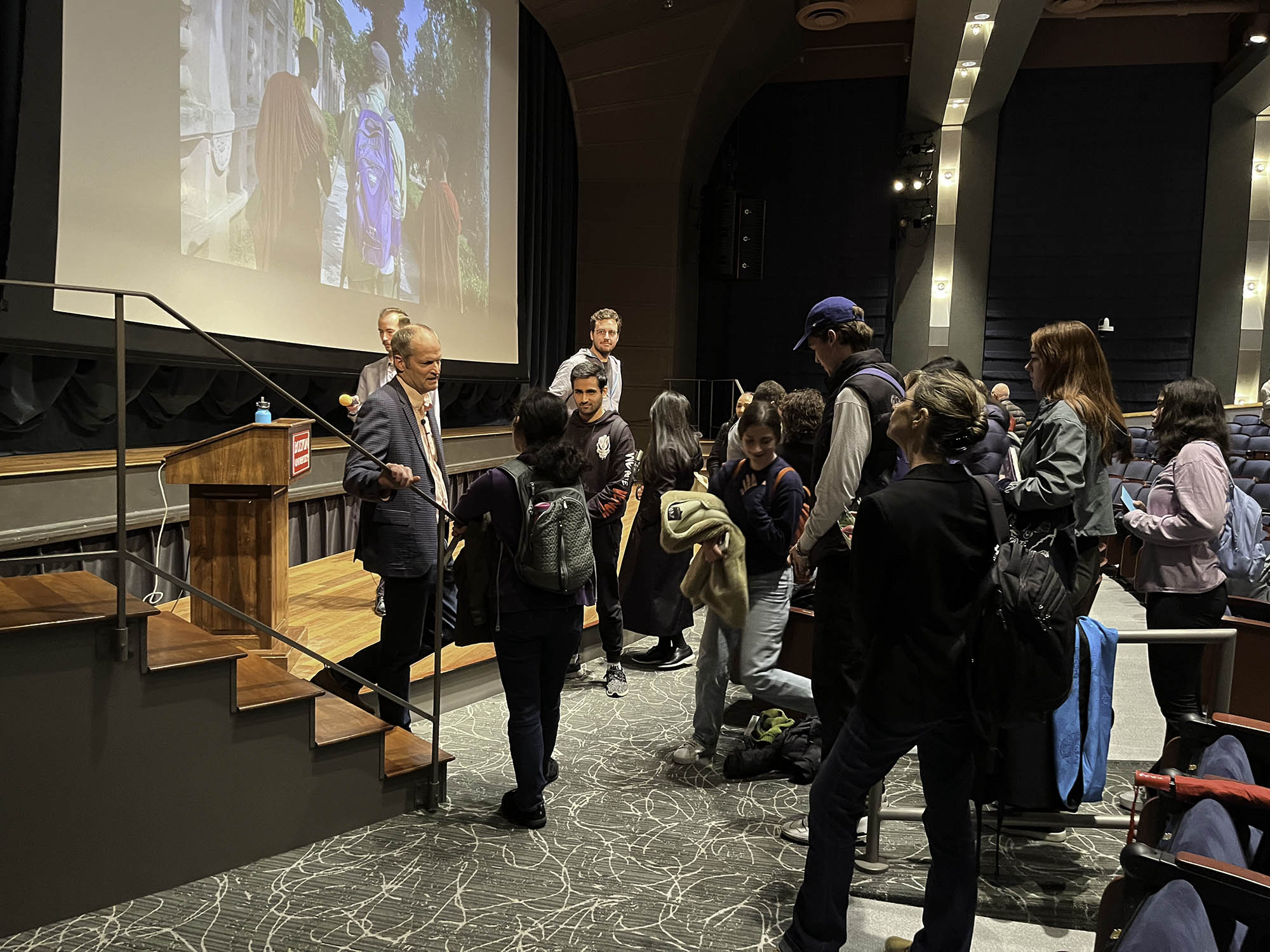Stephen Prothero’s “Last Words”: His Final Lecture at BU
Noted religion scholar and public intellectual retires after 27 years

Religion scholar Stephen Prothero, one of BU’s most prominent faculty members both on and off campus, took student questions after giving his final lecture before retiring. Photos by Meera Subramanian
Stephen Prothero Delivers a Deeply Personal, Final BU Lecture
Noted religion scholar and public intellectual retires after 27 years
For two decades, Stephen Prothero’s semester-ending lecture in his Death and Immortality class has pondered “last words”—dying people’s utterances, tombstone inscriptions—and the importance we attach to them.
But last week, Prothero’s “last words” closed out not just the class but his 27 years at BU—“longer than most of you have been alive,” he noted. That career made him one of the University’s best-known scholars both on and off campus, a public intellectual who wrote bestsellers and columns in major media publications and yucked it up on-air with Jon Stewart and Stephen Colbert.
“Today, I have some last words of my own to offer,” Prothero, a College of Arts & Sciences professor of religion, told the class, which included invited returnees from semesters past and faculty colleagues. “Not my last last words, I hope, but my last words to BU students as a BU professor.” His hour-plus lecture veered by turns humorous and sober, philosophical and autobiographical.
Of his retirement from the faculty (though not from the workforce; the author of 10 books, he is plugging away on another as well as a textbook), it’s “about recognizing limits,” he said. “As much fun as this has been, it cannot go on forever. Things change.” He disavowed the example of one of his heroes, Ruth Bader Ginsburg, whose refusal to step down from the Supreme Court as her health failed allowed a Republican president, after her death, to replace her with a conservative judge.

“James Howard Hill, Jr., the brilliant young scholar from the University of Oklahoma who is replacing me next fall, will bring far more to his teaching and research here than I can at this stage,” Prothero said. “He is better equipped than I am to meet new challenges in academia regarding freedom of speech—and ChatGPT even, maybe?”
Prothero also recounted family lore about his great-grandmother, a devout Christian who had cancer late in life and “took to her deathbed with the close-to-certain hope of the resurrection.” Prescribed an opium-like painkiller to smoke, she dropped her pipe. “As she reached for it, she stopped up short. ‘Shit,’ she said, and then she died.
“You can laugh at that,” he assured his listeners.
His father, Prothero recalled, had been the attending doctor at the hospital to which Malcolm X was transported after his 1965 shooting, trying vainly to save the civil rights leader’s life. “I have had the privilege of sitting by my father and holding his hand as he died,” he reminisced, “my thumb pressed into his wrist in search of the exact moment. I helped the funeral director carry his body out of his bedroom to a waiting car. At the crematory, I watched as his body was pushed into a furnace; I placed his ashes in his grave.”
He recalled his dying father’s words of comfort to his family when asked by a visiting minister what he was afraid of. In a strong voice that had faltered in his illness, “He said, ‘I am not afraid. I am not afraid of anything.’
“I wish I could say the same, and I still hope that when my time comes, as it will come to all of us, that I will be able to say the same. To offer my daughters and my wife the gift of acceptance that he gave us that day.”
Looking back on a very public career
In a pre-class interview, Prothero elaborated on his retirement: “Teaching this course so often, it just made me realize that life is short, and I don’t want to die in my office. I’d rather die, like, hiking in southern Spain.” (His wife is a globe-trotting freelance writer, and “it’d be fun to go hang out with her,” he said.)
Life is short, and I don’t want to die in my office.
If retirement is a form of death, Prothero, 62, plans an active afterlife. “I kind of have two full-time jobs”—teaching at BU and writing—“and it’s stressful,” he told BU Today. “I’m too busy. Writing is sort of my happy place, and I really don’t want to give that up.” His books and columns have argued “for a kind of pluralistic vision of the United States, in terms of religion, in terms of race, in terms of ethnicity.” (Personally, he’s “religiously confused,” he said during his final lecture; while not a regular worshiper, he finds religion “a repository of great questions.”)
In the wake of 9/11, Prothero’s defense of pluralism became a media magnet in a country thirsting for information about Islam and other traditions. His 2007 New York Times bestseller Religious Literacy: What Every American Needs to Know—and Doesn’t so intrigued Daily Show host Jon Stewart that he booked the professor. After writing his survey of major faith traditions, God is Not One, Prothero advised Stephen Colbert on a possible new religion when the comic gave up Catholicism for Lent.

His just-published God, the Bestseller (HarperCollins, 2023) details the career of editor Eugene Exman, whose personal quest for the divine led him to shape American religion publishing, shepherding in print writers from Dorothy Day to Martin Luther King, Jr. (GRS’55, Hon.’59) to Howard Thurman (Hon.’67), Marsh Chapel’s dean from 1953 to 1965.
Prothero’s guidance as teacher and author proved invaluable to Kira Ganga Kieffer (GRS’23), one of his PhD advisees, a teaching fellow for three semesters in Death and Immortality, and a research assistant for several of his books. “Steve has been incredibly generous with the level of engagement he has had with my work, in developing me as a scholar and encouraging me to follow my own ideas, but also always having the highest of standards for me,” she said. “Never quite saying this is great, he always pushes you to try and go even further. And he’s been a huge inspiration to me in terms of wanting to write for more of a public audience. I think his public scholarship is so important.”
Apropos of that, Princeton University plans to publish Kieffer’s book next year on religion and vaccine hesitancy, pivoting off her dissertation. “Steve has helped shepherd me through that process,” she said. Attending his last lecture, “I’m emotional for sure,” especially given that Death and Immortality drew many students from various BU schools, “and lets us talk about something that is a universal. It’s helped me, having taught it three times, to engage in meaningful conversations with students in my own teaching, in my own writing, and in my own personal life [about] death, and how we as humans handle it in all these different ways.”
David Frankfurter, interim chair of Prothero’s department, calls him the department’s “soul…as it has moved into the 21st century,” a “magnetic teacher” behind popular courses like Death and Immortality—199 students enrolled this spring—and an academic with a popular audience.
“His work has taught a grateful public,” Frankfurter says, “about what it means to generalize about religion, what ‘religious literacy’ should mean for those who would talk about different religions, and the transformation of Jesus from ancient gospel figure into a modern superhero and advisor,” through his 2003 book, American Jesus.

Opinion columns, especially for CNN, extended Prothero’s popular reach. But the past few years soured him on op-ed opining. “I got really tired of writing about Donald Trump,” he said in the interview. “I’m also a little dispirited by the traction that he’s gotten,” most relevantly among Christian nationalists.
This new climate has changed his views of religious liberty. In 2018, the Supreme Court ruled that Colorado acted with bias in enforcing anti-discrimination law against a baker who declined to make a wedding cake for a gay couple on religious grounds. At the time, Prothero sided with the baker’s religious rights. But now, he said, he believes freedom of religion and speech “rely on a certain matter of good faith that doesn’t really exist anymore in the culture”—partly because of social media algorithms that gin up controversy, and partly because the Supreme Court now interprets religious freedom as “preserving the freedom of Christians, and especially right-wing Christians, whereas historically, it’s been about preserving the freedoms of the Amish and Jehovah’s Witnesses and marginalized groups.”
Looking back on the baker’s case, he said, “I felt like I was playing in a poker game where…the rules changed halfway through the game.”
About BU, however, Prothero remains unabashedly gung ho.
“This place has really changed since I’ve been here, for the better,” he said, particularly in its leadership’s choice to diversify the student body. Reviewing photos of students over the years for Death and Immortality, he noticed how they’d changed from monochrome (white) to mosaic, including students of color and from abroad. “It’s such a better environment in the classroom, because in the past, if I was teaching Hinduism, when I first came, there wouldn’t be any Hindu kids in my class. And then once I was here for maybe five years, there would be like one or two Hindu kids in my class. And now, I might have two dozen Hindu kids in my class. So, I can ask a question about Hinduism, and I can have Hindus weigh in and disagree with each other.”
As he told those at his final lecture, “This diversity—your diversity—has enriched my courses immensely.”
Taking comments after his valedictory lecture, Prothero received a career requiem from the last person to speak, current Death and Immortality student Abby Duerksen (CAS’23). “I just really want to thank you for this class,” she said, recalling her initial skepticism at taking an entry-level course her senior year. It became one of her favorites.
“I’ve come to realize it’s all for a reason,” she said. “And I am very grateful that you’ll be speaking at my [religion majors] graduation.”

Comments & Discussion
Boston University moderates comments to facilitate an informed, substantive, civil conversation. Abusive, profane, self-promotional, misleading, incoherent or off-topic comments will be rejected. Moderators are staffed during regular business hours (EST) and can only accept comments written in English. Statistics or facts must include a citation or a link to the citation.